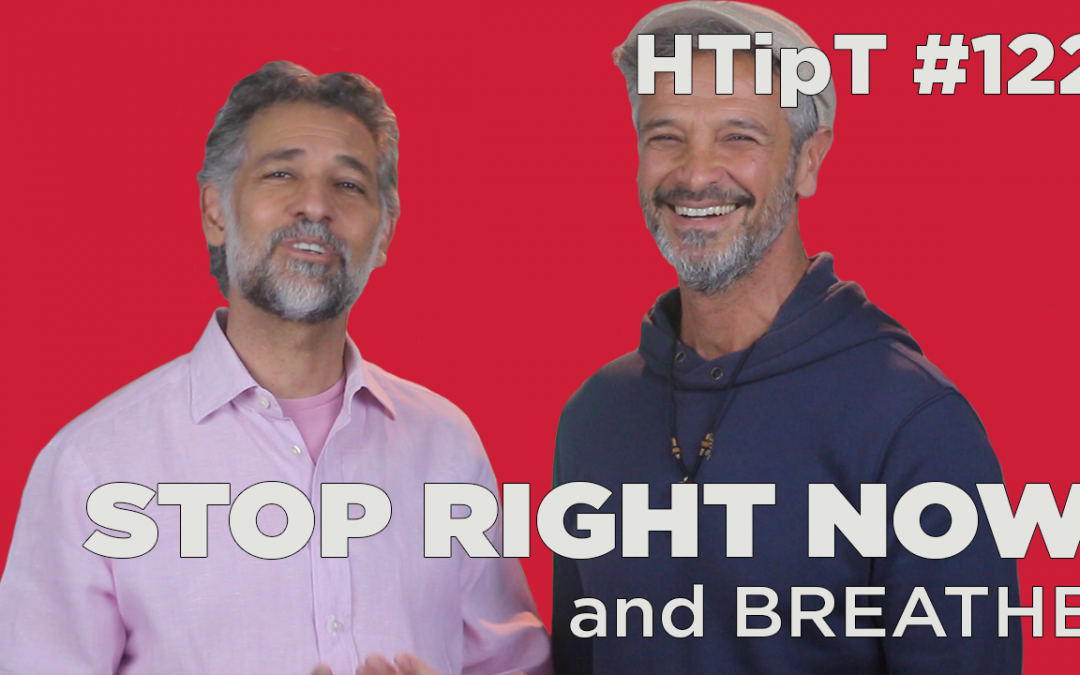People always say, “take a breath”. We know that three calming breaths actually works, yet we don’t seem know know how to use this basic tool for our own wellbeing.
Video:
[embedyt]https://youtu.be/67dnpY9cCcM[/embedyt]
Podcast:
[powerpress]
[social4i size=”small” align=”float-left”]
Video Transcript:
John Paul: Hi, John Paul Fischbach again. I’m the Chief Alchemist and CEO here at the Auspicious Arts Incubator and we decided we had to shoot yet one more thing while we have Bassam. He’s travelling the world so we’ve caught him today. We thought that there was something else that we started to talk about… We talked to artists a lot about one of the techniques that you can use to center; to deal with emotional management – is just to take a breath. Take three slow breaths and the thing that we know to do but we dont do so we were just talking about the power of breath. That is one of the things that Bassam does is work with people on breath work. What is it about the breath? What is it about taking a breath that actually does the work?
Bassam: As survival we may talk about three. It’s one of the most important if not the most important. The first one is food. You can survive without food for how long? 40 days. We can survive without water for four days. Important, but water is more important than food. The breath, we can survive without the breath for 3 to 4 minutes. As a survival strategy the breath is important. It’s all important and it’s underestimated. The fact is most people are holding a breathing dysfunction but they’re not aware of it.
The nose, the chest, the belly and the spine, it’s a single unit. It’s a breathing pump. It’s a pump of life but most people breathe to survive but not to thrive. They barely give themselves any energy. What that means is that most of the time they are withholding a quality of energy from their body which means their functionality is compromised.
It’s like saying here, take this. Hold this. Breathe on that. Live on that for the next 30 seconds until I give you another one. Why this prejudice? Why this scarcity of breath and yet it’s the most abundant thing for us? The way it works is when we begin to become aware of our breathing we allow a rigidity in the body to be released. To be present to the breath means to be also be present to the body. I begin to allow myself to take in life. In that permission I am giving myself also permission to soften. In that softening something else can come into the body and release into the moment. There is no rigidity there anymore. The rigidity is gone. Many people say it’s because the breath and the energy, you’re hyperventilating. It’s insane. Hyperventilation can be treated with the breath. It should not happen. It is a clinical condition that isn’t necessary.
What we do know about this to put the cap on this fi you like is this is that when we are in the state of anxiety or stress we’re not breathing. One of the things that you can do is monitor okay, I’m not breathing. We associate the lack of breathing with stress. What is the opposite of that? The opposite of the absence of breath is breath. The opposite of stress is release, is the softness and this permission to be myself in the moment, fully myself in the moment. The breath gives us a permission to let go of our anxiety. Breath is the signature of the self. The way you breathe is specific to who you are. If you can make an amendment to it, if you can allow it to soften, allow it to release to become more present you really are becoming more of who you are. You’re becoming more as a human being simply because you are breathing in more life. Your battery is fully charged. You’re not just charging it for a second or two and then hello, I haven’t got time to talk. You’re coming from a place of fullness as opposed to a place of scarcity of self.
John Paul: There we go. Okay guys, let’s have some nice full softening breaths. I love that concept. It’s not about the amount. It’s about the quality.
Bassam: It’s the quality, presence of the breath and permission to breathe. Not just once every hour but to continuously give myself permission to breathe.
John Paul: Here’s to breathing. It really is the key. I remember as an actor in training you would lay on the floor in voice class the first six months. You just laid on the floor and breathe. That’s all you did was just breathe every day. It was really cool.
If this tip was useful please share it with someone else. There is another artist that would really benefit from this so please share it around. If you want real practical advice for your arts career, your arts practice, check us out at www.auspiciousartsincubator.org. Below this we’ll give you the links to track Bassam to know where he is and what he’s doing.

